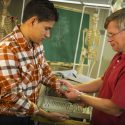School of Social Work’s diversity efforts garner YWCA award
When Assistant Professor Tracy Schroepfer joined the School of Social Work‘s Committee for the Recruitment and Retention of Students of Color (RRSCC) five years ago, those in her field were facing a crucial dilemma.
"We know that in social work, our clients are very diverse, but the problem is the population of social workers is mostly Caucasian, and oftentimes our clients are wanting a social worker who shares their culture," she says. "The profession of social work in the United States is not always able to meet that need."
Five years later, Schroepfer is still chair of the committee, which is being praised for its work in recruiting students of color. On Tuesday (Oct. 30), the school was one of four institutions honored by the Madison branch of the Young Women’s Christian Association (YWCA) for its diversity practices at the organization’s annual Racial Justice Community Summit.
According to Colleen Butler, racial justice and community outreach manager for the YWCA Madison, the YWCA used a survey sent to many local organizations to gauge what types of diversity practices were being developed in Madison. The survey had four categories — recruitment, retention and organizational climate, diversity training and service delivery — that were later used to define the best practices awards.
Of the 42 organizations that completed the survey, the school won the YWCA’s award for recruitment. Other organizations that won best practice awards were Alliant Energy for retention, Edgewood College for service delivery and Grassroots Leadership College for diversity training.
"I would say everybody who submitted the survey clearly had thought about recruitment and were trying to engage in successful recruitment strategies to diversify their staff," says Butler. "But the School of Social Work had gone above and beyond. They had a lot of creative strategies."
In the school’s master’s program, the percentage of students of color enrolled in the incoming fall class was 10 percent in 2005-06; 21 percent in 2006-07; and 13 percent in 2007-08. In the bachelor’s program, the percentage of students of color enrolled in the incoming fall class was 16 percent in 2005-06; 16 percent in 2006-07; and 35 percent in 2007-08.
Many of the School of Social Work’s recruiting efforts in recent years have benefited from a grant from the National Sciences Foundation, Schroepfer says. Specific recruitment strategies include current students calling applicants, participating in recruitment fairs, creating a resource manual for students of color in Madison, and inviting potential students of color to the school to socialize with current students each year as part of a Spring Brunch weekend.
At the 2007 Spring Brunch weekend, Schroepfer says the school brought in state Rep. Tamara Grigsby, D-Milwaukee, a graduate of the program, to speak about different career paths for social work majors.
Schroepfer says the school has also focused on more than just direct recruitment by seeking to create a friendly, open atmosphere in the program and fostering relationships between white and minority students.
"We want to make the school more inviting for students of color, more warm and welcoming, and also to get our Caucasian students, some of whom have said they’ve never met a person of color before coming here, to get them to think more about, to understand and learn more about other cultures," she says.
Social work students have also been actively involved in the school’s mission to diversify. One student organization called SHADE — Students Helping Achieve Diversity and Equality — holds cultural diversity dialogues several times each semester that bring people together for open, respectful discussions of diversity issues.
Encouraging students to participate in the school’s recruitment efforts, SHADE representative Kari Ehrhardt says, gives social work students real-life experience to apply what they learn in the classroom.
"In social work, you kind of get these concepts at a theoretical level in your classes, and we wanted to build on that and work within the community that is our school to make things more open and friendly," she says.

